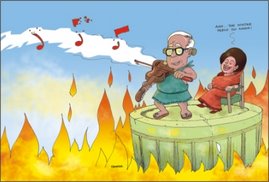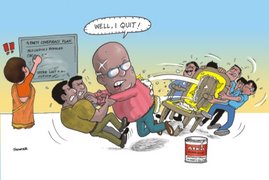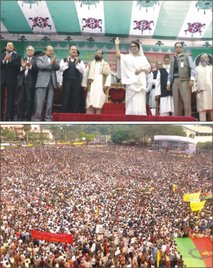 President Iajuddin Ahmed last night resigned from the post of chief adviser to the caretaker government, declaring a state of emergency in the country--amid growing political crisis over election. Nine advisers to the caretaker government also resigned from their posts and the senior most among the advisers Justice Fazlul Haque, took the charge as acting chief adviser. The parliamentary election scheduled for the January 22 has also been postponed.
President Iajuddin Ahmed last night resigned from the post of chief adviser to the caretaker government, declaring a state of emergency in the country--amid growing political crisis over election. Nine advisers to the caretaker government also resigned from their posts and the senior most among the advisers Justice Fazlul Haque, took the charge as acting chief adviser. The parliamentary election scheduled for the January 22 has also been postponed.Besides suspending all fundamental rights as described in the constitution, the authorities imposed a six-hour curfew--from 11:00pm to 5:00am--in all metropolitan cities and district headquarters with immediate effect from last night until further orders. The declaration of the state of emergency came after daylong hectic negotiations yesterday among the political parties, diplomats and the caretaker government advisers to resolve the growing political crisis following Iajuddin's assumption of the office of chief adviser on October 29 last year.
 Prior to declaring the emergency, the president held a meeting with the chiefs of three services at Bangabhaban. The armed forces had been deployed across the country on Wednesday for election duties. The home ministry started instructing the deputy commissioners, metropolitan polices and other officials concerned to enforce the state of emergency across the country. Railway and bus stations were crowded yesterday with the public rushing to their homes, following the president's declaration of state of emergency and the 11:00pm-5:00am curfew.
Prior to declaring the emergency, the president held a meeting with the chiefs of three services at Bangabhaban. The armed forces had been deployed across the country on Wednesday for election duties. The home ministry started instructing the deputy commissioners, metropolitan polices and other officials concerned to enforce the state of emergency across the country. Railway and bus stations were crowded yesterday with the public rushing to their homes, following the president's declaration of state of emergency and the 11:00pm-5:00am curfew.The issuance of the proclamation automatically suspended the operation of the fundamental rights guaranteed by articles 36, 37, 38, 39, 40 and 42 of the constitution. These articles deal with the freedom of movement, freedom of association, freedom of thought and conscience, and of speech, freedom of professions or occupation, and rights to property. No one will be allowed to file any case with the court challenging the validity of the emergency and suspension of the fundamental rights. Referring to the constitutional provision for declaring the state of emergency, the president in the proclamation said a grave emergency exists in the country in which the security or economic life of Bangladesh is threatened.
The president declared the state of emergency in the wake of the Awami League-led grand alliance's boycott of the parliamentary elections scheduled for January 22 and its series of siege and hartal programmes to resist the polls. Although the president in the proclamation did not specify the timeframe for the enforcement of the emergency, it shall cease to operate at the expiry of 120 days unless it is approved by a resolution of parliament before the expiry. The state of emergency was last declared on November 27, 1990 during the regime of autocratic military ruler HM Ershad and it was in effect until December 6, the day Ershad resigned from presidency following a mass upsurge.





